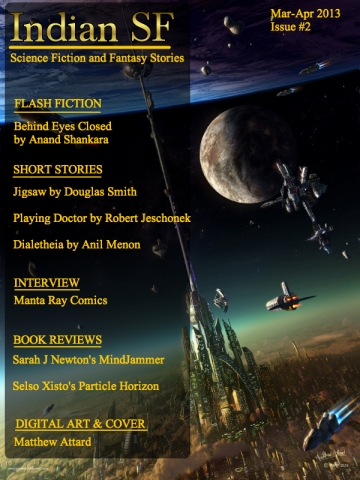Submitted by Douglas Smith on Fri, 2013/04/05 - 11:49am
This weekend, I'll be appearing as an author guest at Ad Astra, the excellent fan-run convention in Toronto (well, actually Markham). See below for my schedule of readings, signings, and panels, which includes moderating a panel with Jim Butcher. Woo hoo!
- Friday 9:30 pm (Floor 2, Suite 2): Reading (I'll be reading from my Aurora-eligible story, "The Walker of the Shifting Borderland"
- Saturday 3 pm (Ellsemere East): Demons, Werewolves, and Necromancers Douglas Smith, Jim Butcher, Timothy Carter
- Saturday 4 30 pm (Berczy B): Autograph Session (to 6 pm)
- Saturday 9:30 pm (Suite 1401): Reading at the digital launch for the Blood and Water anthology (I'll be reading my story "Spirit Dance")
- Sunday 11 am (Berczy A): How Do You Know It's Done? Douglas Smith, Stephanie Bedwell-Grime, Marie Bilodeau, Gabrielle Harbowy
- Sunday 12 pm (Arctic): Animals In Fiction Douglas Smith, Sarah Water-raven, Fiona Patton, Sandra Kasturi
- Sunday 2 pm (Berczy A): Save the Cat: Writing Has Rules Kelley Armstrong, Douglas Smith, Max Turner
Hope to see you there!
Submitted by Douglas Smith on Tue, 2013/04/02 - 11:25am
Part 11 of my blog series at on marketing and selling short fiction is now up at the new Amazing Stories site. This week's post is the second of three on the logistics of how to submit to short fiction markets, focusing on manuscript formatting, including how to format things that only occur in speculative fiction, as well as explaining about word count. Next week, I finish talking about the submission process by discussing things not to do when submitting to short fiction markets.
Check out Part 11 here, and please feel free to leave a comment or ask a question. Thanks!
Submitted by Douglas Smith on Mon, 2013/03/25 - 9:26pm
Part 10 of my ongoing series on marketing and selling short fiction is now up at the new Amazing Stories site, a tad delayed from my normal Saturday posting schedule. This week's post is the first of three on how to submit to short fiction markets and covers such fascinating stuff as cover letters. Okay, not so fascinating, but if you're a new writer, it's stuff that you need to know and that most newbies, for some reason, seem to mess up. Check it out here, and leave a comment, ask a question, tell a joke. Just show up. Thanks!
Submitted by Douglas Smith on Sun, 2013/03/17 - 12:24pm
Still playing catch-up on my blog series at Amazing Stories. Part 9 in my series on selling short fiction went up yesterday. After pointing you to the best market list resources on the web in Part 8 last week, this week's post deals with how to determine which is the best market for your particular story, based on an analysis of their submission guidelines and some research, considering factors such as story length, genre, payment, rights (again), and other factors.
Submitted by Douglas Smith on Sun, 2013/03/17 - 12:15pm
Forgot to post about this one, although if you're following me on Twitter, you would've got a notice. Part 8 in my continuing series on marketing and selling short fiction went up last week on the new and spiffy Amazing Stories Magazine site. This one deals with finding markets that publish short fiction. I provide my recommendations on the best online resources for identifying available short fiction markets, and talk about how to use them to select your list of top markets. The lists are slanted to speculative fiction, although I do provide some resources for literary fiction as well.
If you write short fiction or if you want to, check out the series. Here's a list of all the posts so far. And please feel free to comment on any of the posts. It helps me writing them if I know that there are people out there who are reading the series. Assuming I keep to my planned weekly schedule for the series, a new post will go up each Saturday (more or less). If you want to be notified of a new post in the series, follow me on Twitter. And in answer to several inquiries and suggestions, yes, I will be pulling all of these posts into an ebook after I finish the series, which is likely to be sometime in August or September.
Submitted by Douglas Smith on Mon, 2013/03/04 - 3:05pm
 My science fiction short story "Jigsaw" has been republished in issue #2 of the relatively new bi-monthly webzine, India SF. which brings me to thirty countries in which I've been published. "Jigsaw" first appeared in the Julie Czerneda-edited young-adult anthology, Odyssey, in 2004. It was a finalist for the Aurora Award in 2005. It is also, for some reason, my best selling short story ebook. Here's the story blurb:
My science fiction short story "Jigsaw" has been republished in issue #2 of the relatively new bi-monthly webzine, India SF. which brings me to thirty countries in which I've been published. "Jigsaw" first appeared in the Julie Czerneda-edited young-adult anthology, Odyssey, in 2004. It was a finalist for the Aurora Award in 2005. It is also, for some reason, my best selling short story ebook. Here's the story blurb:
Humans are just beginning to explore the outer reaches of our solar system when the wormships are discovered outside the orbit of Pluto.
Abandoned? Lost?
Or left to be found? Found with charted wormholes in Sol System. Found with incredibly ancient yet perfectly functioning Wormer technology.
Five years later, humanity is exploring the stars.
But now something has gone wrong with the perfect Wormer technology. The orbit of the wormship, The Johannes Kepler, is decaying, and Cassie Morant, ship geologist, has less than twenty-four hours to solve a planet-sized, eons-old puzzle--or the entire crew will die. Cassie's good at puzzles, but this one has a piece missing. A big piece.
Now Cassie has one last chance to save the ship and the man she loves. But time's running out...
If you're interested, you can check out reviews of the story and buy the ebook version of "Jigsaw" online.
Submitted by Douglas Smith on Sat, 2013/03/02 - 2:12pm
 Part 7 in my ongoing series of posts at Amazing Stories on marketing and selling short fiction is now up. This week's topic is on how to decide where to send your story first. Hint: start at the top. Next week, I'll be discussing how to find available markets and how to understand submission guidelines.
Part 7 in my ongoing series of posts at Amazing Stories on marketing and selling short fiction is now up. This week's topic is on how to decide where to send your story first. Hint: start at the top. Next week, I'll be discussing how to find available markets and how to understand submission guidelines.
I missed a couple of weeks of posting for this series, but I plan to be back on a regular weekly schedule again now. The gap was due to an extended vacation and business trip to New Zealand and Australia. I did a 6-day cycling tour on the south island in New Zealand and fell in love with that country. The photo at the left is pretty typical of the scenery that we were cycling through. We went from Queenstown, over the mountains to the west coast, up the coast, and then inland again, finishing with a beautiful train trip through the mountains to Christchurch. Fantastic trip, and I can't wait to get back there again.
Back to the writing topic, if you haven't been able to follow my Amazing Stories blog series, you can catch up on all of the past posts here.
Submitted by Douglas Smith on Sat, 2013/02/16 - 7:29pm
The next post in my series at Amazing Stories on marketing and selling short fiction is now up (well, actually, it's been up for a while, but I've been travelling). This week's entry deals with submission fear and knowing when it's time to stop rewriting, editing, and tweaking that story, and to send it out into the world. Check out this week's post here. I'll be skipping a post this week, but hope to have part 7 up next week and be back on a regular weekly posting schedule.
Submitted by Douglas Smith on Sat, 2013/02/02 - 1:39pm
Submitted by Douglas Smith on Sat, 2013/01/26 - 2:35pm
The next post in my series at Amazing Stories on marketing and selling short fiction is now up. This week's entry is the first of a 2-week discussion on why you never "sell" a short story. These two posts contain information on how licensing of fiction rights work, information that is critical for every short story writer to understand. Check out this week's post here.
Pages